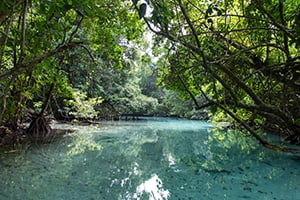
Like most Small Island Developing States (SIDS), Vanuatu presents very specific logistical challenges for government, regulators and operators alike when it comes to establishing universal connectivity.
With a population of 255 000 spread over 83 islands in the South Pacific, simply transporting ICT equipment into remote and rural areas is a major issue. A fibre optic network is impossible in this topography, and satellite connectivity often prohibitively expensive. Many isolated areas have little or limited access to power; literacy rates, let alone ICT skills, are low.
But for Vanuatu, these challenges have become an opportunity to show what can be done with political will and stability, commitment and hard work. Between the landing of the first submarine cable in November 2013 and March 2014, all operators and ISPs active in Vanuatu were connected, reducing the cost of wholesale bandwidth by more than 50%. Users have higher quality, reliability and speed in broadband services, driving growth in a range of internet-dependent business sectors such as finance, real estate and tourism – and pushing up GDP.
This represents a major achievement in terms of increasing universal connectivity. But we’ve gone beyond far beyond that with an ambitious, government-backed social development project to provide broadband access to schools and health centres across the nation. Successful pilot schemes have proved that education and community centres are the best locations to establish local hubs of connectivity, bringing broadband to students, teachers, their families and businesses. Starting with 24 sites by the end of 2014, the aim is to connect 98% of all schools by 2018. It’s an holistic approach: ministry programmes are developing curricula, building online content, training teachers and students, ensuring the availability of services and content relevant to local communities.
Thanks to our developed ICT strategy, we’re on target to meet that 2018 deadline. Funding is provided from the government, from development partners and from the industry, with operators obliged to pay into a universal access fund and support connectivity in remote and rural locations as a condition of receiving a licence for commercially- viable areas. Our regulatory body is fair, fully independent, and committed to a light-touch approach, letting the market decide and interfering as little as possible.
We’re proud of our ambitious goals, and of what we’ve achieved in recent years: opening the market to competition, inviting foreign private investment, improving coverage from 16% to 90%, establishing fair, independent regulation and a fully integrated government broadband infrastructure.
We also have the first internet exchange in the Pacific, where we hope to establish a computer incidence response team to collaborate at a regional level on raising awareness of cybersecurity and dealing with cyber crime. The first draft of legislation on cybersecurity and privacy laws is currently on its way through parliament. Vanuatu will follow up its successful hosting of the first-ever ITU Child Online Protection workshop in the Pacific with a series of cybersecurity workshops bringing together governments, financial institutions and other SIDS across the region to discuss best practice and develop a common approach.
We’re at the cutting edge of cybersecurity in the Pacific – and also of disaster preparedness and emergency response. ICTs are vital both to monitoring, predicting and detecting the natural disasters to which we as a region are prone, and to managing emergency response. Our major projects include an SMS alert system in the event of disaster, the result of collaboration between major mobile operators and climate change ministers. We’re investing in automating the collection of all data in remote sites throughout the country on tides, tsunamis, volcanic activities and meteorological indicators. And we are working towards hosting a regional workshop on disaster preparedness and ICTs involving all development partners, operators, governments and disaster stakeholders across the Pacific.
Vanuatu is looking forward to showcasing the success of its ICT strategy at ITU Telecom World 2014 as a part of the Make Your Country an ICT Star forum session. For us, ITU Telecom World is the biggest ICT and telecommunications sector event in the world. All the major stakeholders and partners come together, from regulators to CEOs, vendors, suppliers and development partners. It’s the best event to attend to share your accomplishments, learn from the achievements of others and attract foreign investment and development partners. No other event offers so much opportunity for the ICT industry in Vanuatu.
In addition to our forum session, we also look forward to meeting colleagues, peers and other stakeholders from around the world, seeing what they are doing or intending to do, sharing experiences and expertise. We would in particular like to promote our regional leadership and upcoming activities in cybersecurity and disaster preparedness and response. Vanuatu is a rising ICT star in the Pacific – ITU Telecom World is our chance to shine out on a global stage.
